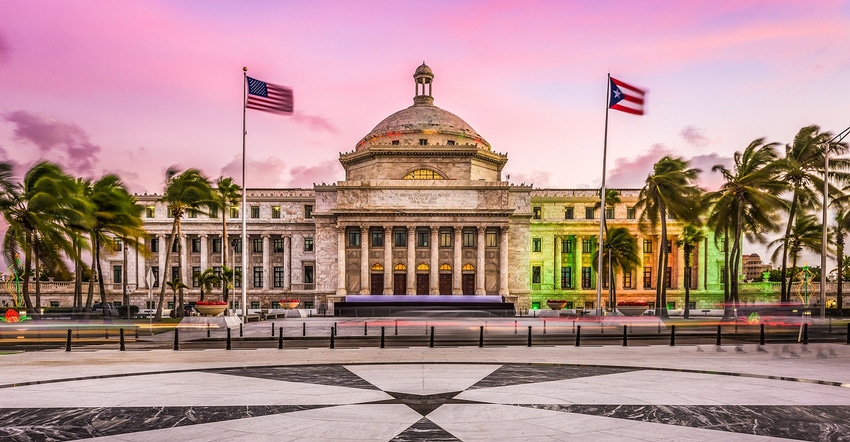New Puerto Rico law may ease registration burdens on dietary supplements
The new Puerto Rico law mandating registration and fee requirements for health products seems to exclude dietary supplement facilities already registered with FDA.

After a battle between the dietary supplement industry and the Puerto Rico Department of Health started nearly three years ago over new registration requirements for drugs and natural products sold in the island commonwealth, a newly signed law in the U.S. territory excludes dietary supplements from the additional requirements, a trade group recently announced.
Puerto Rico Governor Ricardo Rosselló Nevares signed new legislation into law (PC 1034) on Dec. 27, 2018, mandating registration, notification and fee requirements for health products, namely drugs, according to the Council for Responsible Nutrition (CRN).
The law includes a statement seemingly excluding dietary supplement facilities registered with FDA from additional registration requirements.
“With respect to natural products, as long as they are manufactured in FDA-certified laboratories in the United States, they shall not require registration, as they meet all federal requirements for sale, promotion and distribution,” the law states, according to a translated copy.
Although dietary supplements aren’t typically made in “laboratories,” and FDA does not “certify” dietary supplement manufacturing facilities, a representative of the CRN said “certified” is just Puerto Rico’s term of art.
“What they mean is registered,” explained Ingrid Lebert, senior director of government relations for CRN, which worked with government and advocacy groups on the island to promote this bill. “We’ve talked to folks in the legislature, and that’s what they mean. We tried to get them to align their language with what’s on the books in federal statutes, but they are their own territory and are going to do what they are going to do.”
Lebert said the law is a great achievement, but there is still work to be done to ward off any misinterpretation of this law.
“We still need to go back and talk to the Puerto Rico Secretary of State and lean on him to lean on the Secretary of Health to make sure they are interpreting the language the way it should be,” she said in an interview.
According to CRN, the provision exempts dietary supplement companies registered under the Food Safety Modernization Act (FSMA) and the Public Health Security and Bioterrorism Preparedness and Response Act of 2002.
However, neither FSMA nor the Bioterrorism Act are mentioned explicitly in the law. Lebert noted both federal laws were central to the discussion with Puerto Rican legislators of federal dietary supplement statutes that would already require registration and would exclude these products from additional registration requirements in the commonwealth.
“They just didn’t happen to mention FSMA and Bioterrorism in the final text of the bill, but that was the intent,” Lebert offered, noting the Dietary Supplement Health and Education Act (DSHEA) and good manufacturing practices (GMPs) were mentioned in the law. “As long as you are certified/registered under federal statutes already on the books, you’re good to go. This is the message we will push to make sure other Puerto Rican agencies recognized the letter and intent of the law.”
Industry fights commonwealth’s regulatory requirements
The hullabaloo began in February 2016 when Puerto Rico Secretary of Health Ana Ruis Armendariz, M.D., signed an administrative order establishing registration requirements and a fee structure for various health products sold on the island, including dietary supplements.
At the time, many leaders in the dietary supplement industry called the move a desperate ploy to create revenue for the financially struggling Puerto Rico government.
“This rule is arbitrary, unnecessary and potentially damaging to consumers and economic growth in Puerto Rico," Daniel Fabricant, Ph.D., CEO and president of the Natural Products Association (NPA), told INSIDER in 2016.
The supplement industry managed to block subsequent legislation related to the administrative order in the Puerto Rican Senate in June 2016.
Then, the U.S. Congress, which has federal oversight of Puerto Rico, passed PROMESA (the Puerto Rico Oversight, Management and Economic Stability Act) in July 2016, establishing a task force to review the island government’s financial situation. The task force was also charged with reviewing the administrative order from Ruis Armendariz.
After meeting with the task force in September 2016, Ruis Armendariz agreed to issue a 120-day moratorium on the administrative order until the Puerto Rican Congress dealt with the matter legislatively, including a period of public comment, according to the task force's report.
Armendariz left office at the end of 2016, and the fate of dietary supplement registration on the island was still in legislative hands.
However, Rafael Rodriguez Mercado, M.D., took over as Puerto Rico’s Secretary of Health in January 2017, and he issued new registration and fee requirements for dietary supplements (Regulation 9031) in May 2018, mirroring the earlier administrative order from Armendariz.
Lebert said CRN believes the new law (PC1034) negates the health department’s Regulation 9031. The trade group heard the same sentiment from numerous parties in Puerto Rico involved in the legislative effort.
“Our concern was Regulation 9031 and the earlier Administrative Order 346 never actually had statutory authority; no law said they could put this on the books and make this a regulation,” Lebert stated. “But you can’t leave it like that; we wanted something firmer, something official on books, so there is no room for misinterpretation.”
About the Author(s)
You May Also Like






.png?width=800&auto=webp&quality=80&disable=upscale)